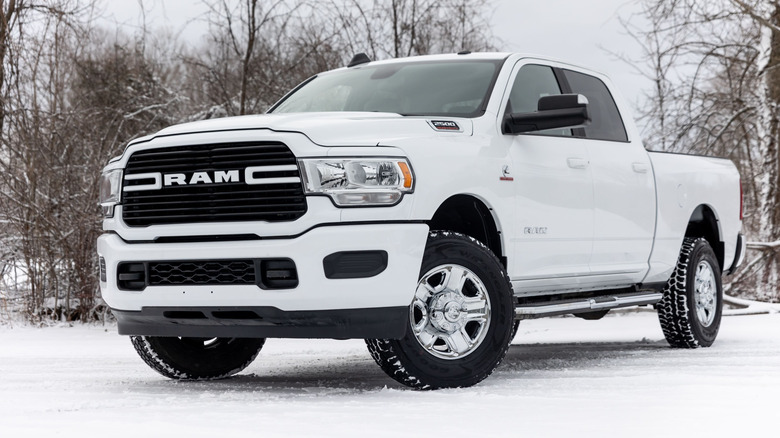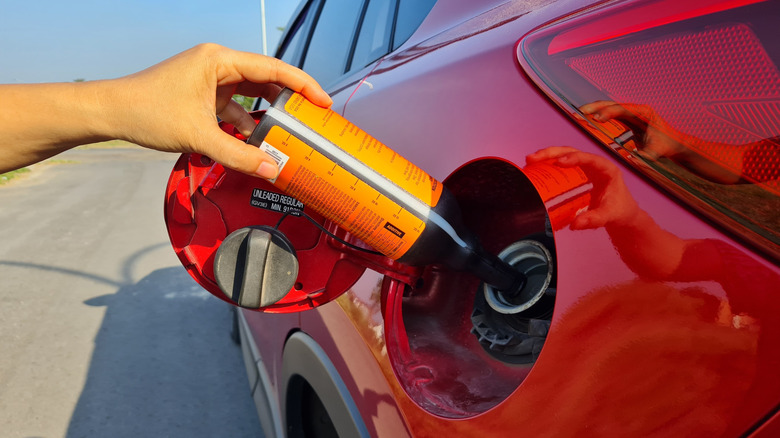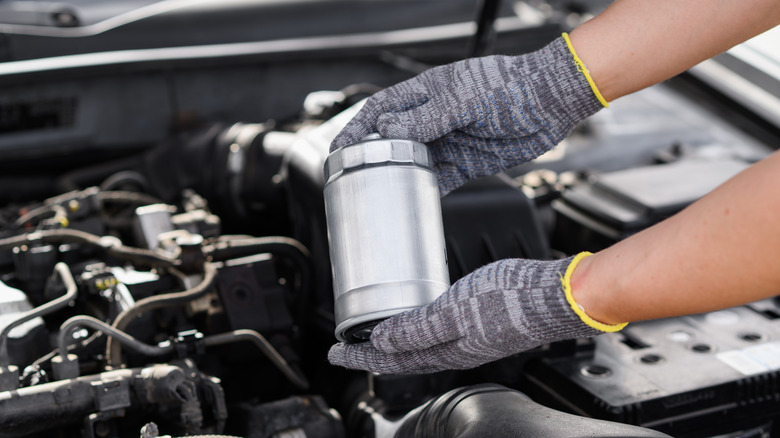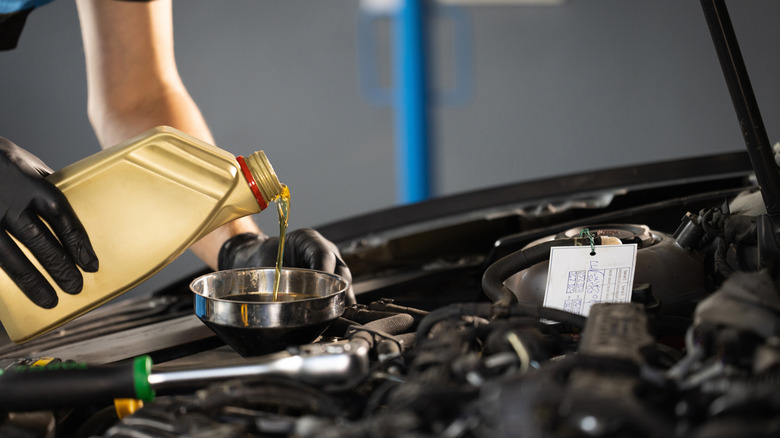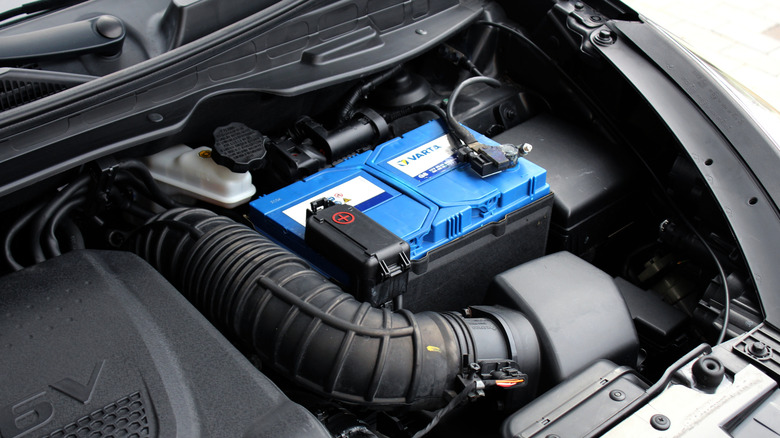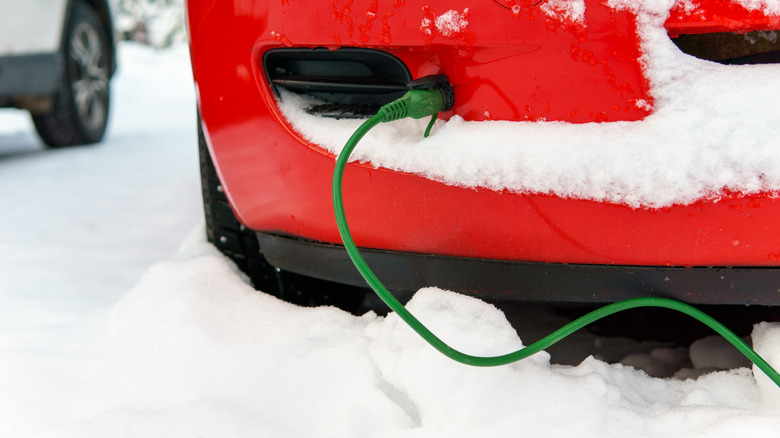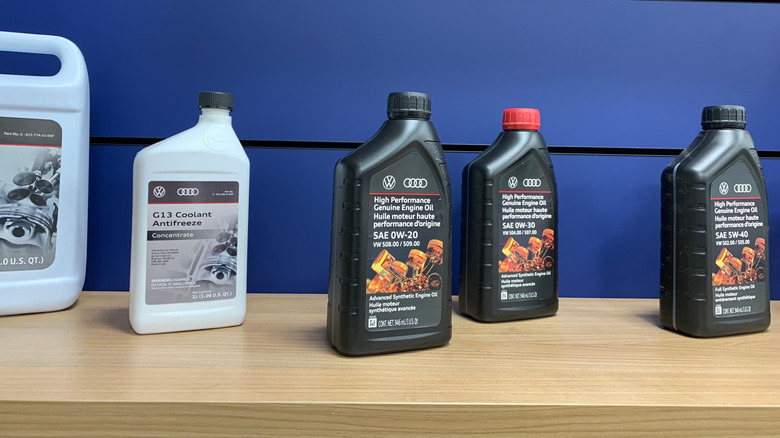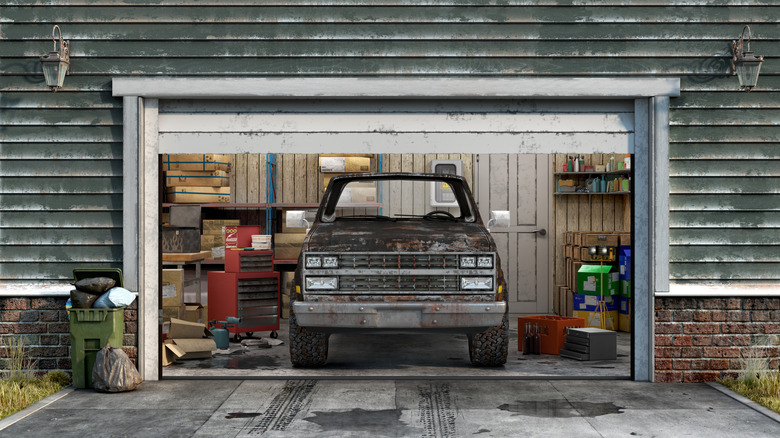10 Tips To Keep Your Diesel Engine Working Through The Winter
You can shovel snow out of the driveway all you want, but if your vehicle isn't up to the task of living somewhere that gets particularly cold in the winter, you'll still find yourself stuck at home. Gasoline and diesel engines both have their pros and cons when it comes to winter driving, but with a diesel vehicle, there are some extra considerations to bear in mind.
Diesel engines are known for offering superb torque and generally requiring less maintenance. For frequently hauling trailers or other heavy items, there's a lot to love with diesel technology. However, all the torque in the world isn't going to help you if your truck can't warm up adequately (something diesel engines struggle with in particular). However, the winter doesn't have to be a death sentence for your pickup. There's a lot you can do before the temperature starts to drop to ensure your vehicle can handle any task, no matter how cold it gets.
Keep a full tank
Diesel fuel tends to be more expensive than regular gasoline, but seeing as how diesel vehicles tend to be more fuel efficient, it's usually worth the extra cost. No matter how pricey it gets, it's always in your best interest to keep your diesel tank as full as possible during the winter months, even you're only short a couple of gallons.
A full tank avoids condensation. A drastic drop in temperature within the fuel tank can cause water droplets to form. This water can then mix with the diesel, which isn't good. Too much water getting into the fuel injectors will cause the engine to malfunction and corrode if it's exposed long enough. With proper maintenance, diesel engines have been known to last anywhere between 500,000 and 800,000 miles. You won't get anywhere near that if water keeps getting into your fuel mixture.
With a full tank, there's not as much room for condensation to develop. Even thinking beyond that, a full tank provides you with peace of mind when it's snowing because there's a reduced chance of running out of fuel on the side of the road. You don't want to end up walking to the nearest fuel station with several inches of snow on the ground.
Use a specialized winter fuel
Diesel fuel is susceptible to gelling in the winter months, where it crystallizes and becomes harder to flow properly through the engine. This can damage the fuel lines and engine, so it's critical to ensure that doesn't happen. Fortunately, there's specialized winter diesel fuel, which typically lacks paraffin and therefore is less prone to gelling.
And you shouldn't have to hunt around to find a winter blend diesel fuel, either. Most gas stations in particularly cold climates switch to offering it sometime during the fall. The Environmental Protection Agency actually requires stations to sell summer fuel until September 15, but many places will choose to go through their reserves before switching to a winter blend entirely.
Once you're ready to make the switch, it's recommended to drain your vehicle of its summer fuel first, as mixing the two can thin out the winter blend enough to cause some gelling. It's better to risk losing a little bit of fuel than have your engine catastrophically fail on you.
Utilize winter fuel additives
Ensuring you're putting a specialized winter blend diesel into your vehicle is only part of the battle, but are diesel fuel additives are actually beneficial or just another add-on mechanics try to sell you on to get more money? You can never be too careful when it comes to the well-being of your vehicle, and seeing how prone to damage diesel engines are in extreme cold, it's better to be safe than sorry.
You may think you've taken every step necessary, but even a little bit of summer blend diesel in your vehicle can still result in gelled paraffin lumps that damage your engine. Perhaps you forgot the drain the tank first, or maybe you filled up at a gas station that hadn't gotten its winter blend yet. An additive increases the odds of maintaining optimal performance.
In addition to reducing the chances of lumps forming, additives also help clean out your fuel injectors and engine. Certain additives contain detergents to clean the inside of your vehicle's system and can also help lubricate the injectors to ensure they move smoothly. Some can also boost your diesel fuel's cetane levels, which is great for avoiding ignition delays. There are numerous additives on the market, so make sure to do your research beforehand to ensure you're putting the best of the best in your truck.
Swap out the fuel filter
A vehicle's fuel filter is essential for catching extremely small particles that could damage the engine if they get that far. Generally speaking, you should replace this filter once every 15,000 to 25,000 miles, but you may need to do it sooner if you start noticing signs your current fuel filter is failing, such as your vehicle getting shaky while idling. Regardless of how many miles it's been since your last replacement, you may be better off replacing it right before the winter season no matter what.
Small gelling lumps can clog up the filter, limiting how much fuel it can send to the engine. That's on top of whatever clogs may have gotten in over the previous year. Depending on how much you drive, you may put 15,000 miles on your vehicle every year anyway, so the start of the cold season is a good reminder to get this essential maintenance done regardless.
Replacing a diesel fuel filter shouldn't cost that much, especially if you just buy the part and do the work yourself. It's a lot more affordable than having to repair or replace your engine, which is what can happen if the filter prevents it from working correctly.
Switch to a low viscosity oil
Diesel fuel isn't the only liquid inside your car you need to watch out for in the winter. Engine oil can also become thicker when exposed to extremely low temperatures. It can become more viscous, preventing it from flowing smoothly throughout your vehicle's internal systems, and resulting in the engine not performing properly. Just like there's a specialized diesel fuel for the winter, you may also need to switch over to a winter-specific engine oil.
Many engine oils promise all-season protection. These will usually fall under the 10W-30 umbrella, but when you live in areas prone to snow, you may want to consider opting for something specially designed for the cold — generally speaking, the 5W-30 and 5W-40 engine oils. These oils offer low viscosity to limit chances of getting too thick.
Viscosity is critical for engine oils, as the substance needs to be able to move freely to lubricate all of your engine's components. This means using an oil that's able to stay resilient at many different temperatures. Remember, it's not just the cold outside the oil has to stand up to — it'll quickly heat up when going through the immensely hot engine, too. Diesel engines usually need new oil every 7,500 to 10,000 miles, so the beginning of every cold season may be a good time to swap out.
Ensure the battery's still good
Your vehicle's battery and diesel engine need to work together in perfect harmony. The battery provides the initial juice to get the engine running, and both of those devices need to work harder in extremely cold climates. Low temperatures slow down the chemical processes within the battery, meaning it can take a little longer to get the juices flowing. Right before it gets too chilly, it's a good idea to check your battery's power to ensure it's capable of handling the oncoming season.
Most batteries last about four years. If you've had yours for a while already, it's recommended to test it to see how much of a charge you can still get. In the event it's already on the low side, a severe cold snap may make it unusable. Cold weather can reduce a battery's capacity by 20%, and the last thing you want is to be away from home and unable to start your vehicle because the battery won't start the engine.
When a battery's already running low on its internal chemical mixture, it can actually freeze on the inside. You might be able to see this for yourself because the exterior will bulge out. Seeing that will mean the battery's completely unsalvageable, but it's probably a good idea to get a new battery before that happens anyway.
Add a block heater
The main reason why diesel engines are susceptible to damage in the winter months is that there's a tremendous leap from extreme cold to immense heat. Your car may have sat overnight in freezing temperatures, but when you start it, things need to get hot really quick. You can save yourself a lot of trouble by keeping the engine and other internal components like engine oil and coolant fairly warm with a block heater.
There are several different types of block heaters available. Some heaters you plug into an outlet and connect to your vehicle while others are more of a blanket you can drape over the engine to keep it warm. An oil pan heater keeps the engine oil warm and viscous.
While block heaters sound like an ideal solution, don't overuse them. Just like any other heater, there's a risk it can catch fire if used too often. Most block heaters only need to be active for three to four hours, so it's a good idea to have yours attached to a timer. You can have it turn on partway through the night so that when you need to turn on your car the following morning, it's good to go.
Replace antifreeze
It's right there in the name. Antifreeze/coolant is essential for your truck to function any time of year, but it's particularly vital during the winter. Depending on the exact make and model of your vehicle, it's suggested to replace the antifreeze once every two to five years (or every 30,000 to 100,000 miles). In case it's been a while, you're better off replacing the coolant before the next big winter storm because you don't want it getting too thick.
Before replacing your vehicle's antifreeze, you should drain what's currently in the system. This also helps remove contaminants that may hamper your diesel engine's functionality. Next, find an antifreeze solution specially designed for cold temperatures and recommended for your specific make and model.
When you're unsure if your antifreeze levels are good, you can test it to see what level it's at and if there's a substantial amount of contamination. Testing strips should be available at most auto parts stores.
Warm up the engine first
It's actually something of a myth that people in cold climates should warm up their vehicles before driving. However, there's still an advantage to doing this, provided you don't let your car idle for too long. Most reputable organizations suggest letting your car run for no more than a minute when warming it up during the winter. Idling for any longer than that means you're just wasting fuel, so there's no need to turn on your vehicle, go eat breakfast, and come back to a warm ride. A minute is all you need.
Granted, you may not need to let your car idle at all if you use block heaters, and you may also want to consider installing glow plugs. Glow plugs are heating elements you install into your engine's cylinders that help heat the incoming air and fuel quickly.
Anyone who lives in an area that's prone to getting as cold as 5 degrees Fahrenheit would do well to invest in a variety of devices to keep their vehicle warm. With the right mix of accessories, your car's internal fluids shouldn't get too cold.
Store your vehicle somewhere warm
When it comes to protecting your diesel engine in the winter, the key is keeping the entire system warm enough to prevent gelling and keep certain components from freezing over due to condensation. The engine will work best if it doesn't have to go from extremely cold to extremely hot in a short span of time, and the easiest thing you can do to accomplish that is simply keeping your vehicle inside a garage, especially overnight.
A vehicle outside is exposed to the elements, and if there's enough moisture, you could find your it covered in snow in the morning, adding one more thing to do in the morning before you're on your way. The garage will naturally provide a little extra warmth, and it'll make it easier to plug in the necessary block heaters to warm up the engine even further.
In the event you don't have a garage (or just not enough room in there for all your cars) you can also try parking under a carport to at least keep any snow off. Additionally, you may want to wake up a little earlier in the morning to move your car and plug in a block heater so that you get a couple hours of warming before needing to take off. It's tough living in places that get this cold, but with a little foresight, you can be confident your diesel engine will survive every winter set to come.
